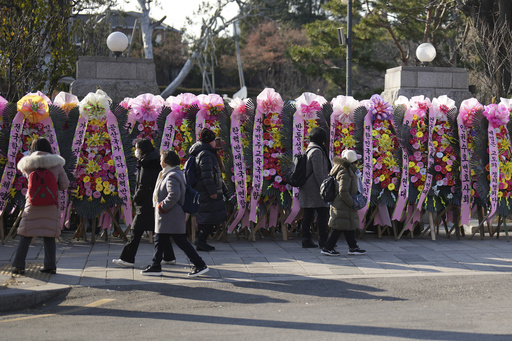SEOUL, South Korea — The acting leader of South Korea pledged on Tuesday to assure the international community that the nation is returning to normalcy after parliament voted to impeach conservative President Yoon Suk Yeol. The impeachment has led to disputes among rival political parties regarding the appointments of judges who will decide whether Yoon will be removed from office or reinstated.
The impeachment vote, conducted by the liberal opposition-controlled parliament last Saturday, centered on Yoon’s brief imposition of martial law on December 3. This parliamentary action has suspended Yoon’s presidential powers until the Constitutional Court reaches a verdict on his status. Should he be removed, a national election is mandated to select a new president within two months.
Acting Prime Minister Han Duck-soo has made efforts to calm both the United States and other allies and to stabilize financial markets. While leading a Cabinet Council meeting, Han stated that he will “continuously do my utmost to inform the international community that the Republic of Korea is quickly regaining stability and maintaining confidence with partners.”
However, significant political conflict is expected to persist as parties engage in disputes regarding the appointment of justices to fill three vacant positions on the Constitutional Court.
To formally end Yoon’s presidency, at least six of the nine justices must support the impeachment effort. With three seats currently vacant due to retirements, a unanimous decision is required from the remaining justices to remove him from office. Out of the nine justices, the president appoints three, the Supreme Court’s head nominates three, and the National Assembly nominates another three before the president makes the final appointments, which is generally seen as a procedural act. Currently, the National Assembly must fill the three vacancies, with two to be nominated by the Democratic Party and one by Yoon’s ruling People Power Party (PPP).
The court can proceed with Yoon’s case using the six current justices. Nonetheless, the main liberal opposition party, the Democratic Party, which spearheaded the impeachment, has vowed to expedite the process of appointing justices to instill fairness and enhance public trust in the court’s judgment.
Kweon Seong-dong, a floor leader of the PPP and a supporter of Yoon, stirred controversy on Tuesday by opposing the nominations for the three vacant positions. He argued that it would be inappropriate for the acting leader to appoint justices nominated by the parliament, affirming that such authority belongs solely to the president.
“An acting president can appoint Constitutional Court justices when there is a vacancy in the presidency, but not when the president’s duties are merely suspended,” Kweon stated.
Many analysts contend that the current configuration of six justices may actually favor Yoon’s chances of retaining his position, as only one justice dissenting from the impeachment could maintain his presidency. They also noted that Cheong Hyungsik, one of the current justices, is a prominent conservative directly appointed by Yoon.
The Democratic Party quickly rejected Kweon’s stance, labeling it as “absurd and utterly nonsensical” and urging the PPP to comply with a previous agreement between their parties to proceed with the nominations for the constitutional court.
Party spokesperson Jo Seoung-lae accused the PPP of revealing their intentions to obstruct the constitutionally mandated trial. Han, the acting leader, did not provide an immediate response but reiterated the government’s commitment to collaborating with both ruling and opposition parties to stabilize the economy.
There is ambiguity surrounding the actions an acting president can undertake in regard to appointing court justices. Nevertheless, legal experts have suggested that Han is indeed permitted to appoint the justices nominated by the parliament due to the lack of any legal restrictions against such actions.
During a parliamentary session on Tuesday, Kim Jung-won, the secretary general of the Constitutional Court, communicated that the court believes that the acting president has the authority to appoint justices. Meanwhile, the Democratic Party has accused the PPP of extending the impeachment trial, which has a timeline of up to 180 days for the court to reach a decision on Yoon’s fate.
Time is critical for Democratic Party leader Lee Jae-myung, who is currently favored in polls to win a presidential election should Yoon be ousted but faces his own legal challenges. Lee risks being barred from contesting for the presidency if the appellate and Supreme Courts uphold his lower court verdict pertaining to election law violations in November.
Yoon confronts allegations of rebellion and abuse of power due to his martial law declaration. Investigative bodies are seeking his testimony later this week; however, officials at both his office and residence denied requests for him to appear on Monday.
The martial law declaration, the first of its kind in over four decades, incited a military presence aimed at surrounding parliament and obstructing lawmakers from voting on the decree. Despite this, numerous lawmakers managed to convene in the National Assembly chambers and unanimously voted to rescind Yoon’s decree, leading to its retraction by Yoon’s Cabinet.
The decree has ignited widespread street protests demanding his resignation and has seen Yoon’s approval ratings sink significantly. High-ranking military officials, including Yoon’s defense minister and police chief, have been arrested due to their involvement in implementing the martial law.
Yoon’s supporters express concern that his possible removal could critically weaken the conservative faction in the country, likely resulting in a presidential by-election victory for the liberals similar to the events following the ousting and arrest of impeached President Park Geun-hye in 2017 due to a corruption scandal.



